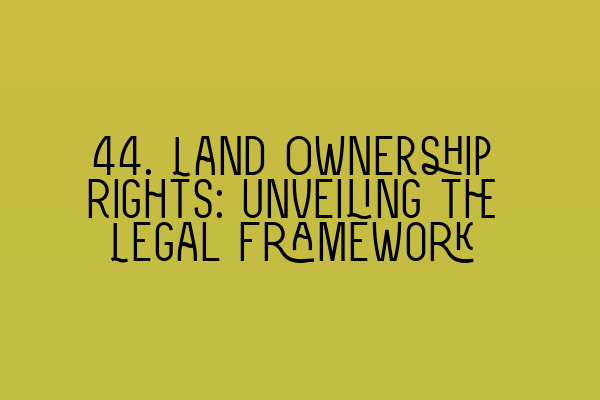44. Land Ownership Rights: Unveiling the Legal Framework
Land ownership rights are a vital aspect of property law, providing individuals and entities with legal protection and control over their land and the assets upon it. Understanding the legal framework surrounding land ownership rights is essential for anyone involved in property transactions, development projects, or disputes.
In this article, we will delve into the intricacies of land ownership rights, exploring the legal principles that govern them and the various forms of ownership recognized by law.
The legal framework for land ownership rights
Land ownership rights in the United Kingdom are primarily governed by a complex web of legislation and common law principles. The main sources of law pertaining to land ownership rights include the Land Registration Act 2002, the Law of Property Act 1925, and various case precedents.
The Land Registration Act 2002 introduced a comprehensive system of land registration, aiming to simplify and modernize the transfer of land ownership. Under this act, land ownership is registered in the Land Registry, providing a secure and reliable record of ownership.
The Law of Property Act 1925 is another fundamental piece of legislation that revolutionized land ownership rights in the UK. It introduced the concept of registered land and unregistered land, providing different systems of ownership and transfer for each.
Registered land is governed by the Land Registration Act 2002, while unregistered land is subject to a set of rules known as the “Doctrine of Notice.” This doctrine requires potential buyers or tenants to investigate the history of the land in question to ascertain any competing claims or rights.
It’s important to note that land ownership rights can vary between England and Wales, Scotland, and Northern Ireland due to differences in local land law. Therefore, it is crucial to understand the specific legal framework applicable to the relevant jurisdiction.
Forms of land ownership
Land ownership in the UK can take various forms, each conferring different rights and responsibilities. The most common forms of land ownership include:
- Freehold ownership: This is the highest form of land ownership, granting the owner complete and indefinite control over the land and any structures on it.
- Leasehold ownership: In a leasehold ownership, the landowner grants a lease or tenancy agreement to another party called the leaseholder or tenant. The leaseholder has a temporary right to occupy and use the land, subject to the terms and conditions outlined in the lease agreement.
- Commonhold ownership: Commonhold is a relatively new form of land ownership introduced by the Commonhold and Leasehold Reform Act 2002. It applies to properties with communal areas, such as apartment buildings or housing estates, and allows owners to have a freehold interest in their individual unit while collectively owning and managing the shared areas.
- Joint ownership: Joint ownership occurs when two or more individuals or entities hold equal or distinct shares in a property. There are two main types of joint ownership: joint tenancy and tenancy in common. In joint tenancy, each owner has an equal share of the property and the right of survivorship, meaning that if one owner dies, their share automatically passes to the remaining co-owners. In tenancy in common, each owner holds a specific percentage of the property, and their share can be freely transferred or inherited.
These different forms of land ownership can have legal and financial implications and may affect rights such as access, use, and transferability. It is crucial for individuals and entities involved in land transactions to understand the implications of each form of ownership and seek legal advice when necessary.
Conclusion
Land ownership rights are a cornerstone of property law, providing individuals and entities with legal protection and control over their land. The legal framework surrounding land ownership is complex, but a solid understanding of the various forms of ownership and the applicable legislation is essential for anyone involved in property transactions or disputes.
If you are preparing for the SQE exam and need practice questions, check out our SQE 1 Practice Exam Questions or take a look at our SQE 1 Practice Mocks FLK1 FLK2 for a comprehensive preparation course.
For those preparing for SQE 2, we offer specialized SQE 2 Preparation Courses to help you master the key topics and skills required for success.
To stay updated with the latest SRA SQE exam dates and other important information, make sure to regularly check our SRA SQE Exam Dates page.
At SQE Property Law & Land Law, our team of expert solicitors is dedicated to providing top-notch legal advice and guidance on all aspects of property and land ownership rights. Contact us today to discuss your specific needs and ensure that your land ownership rights are protected.
